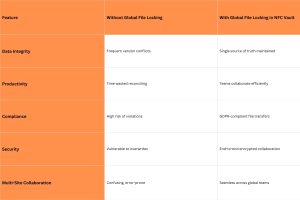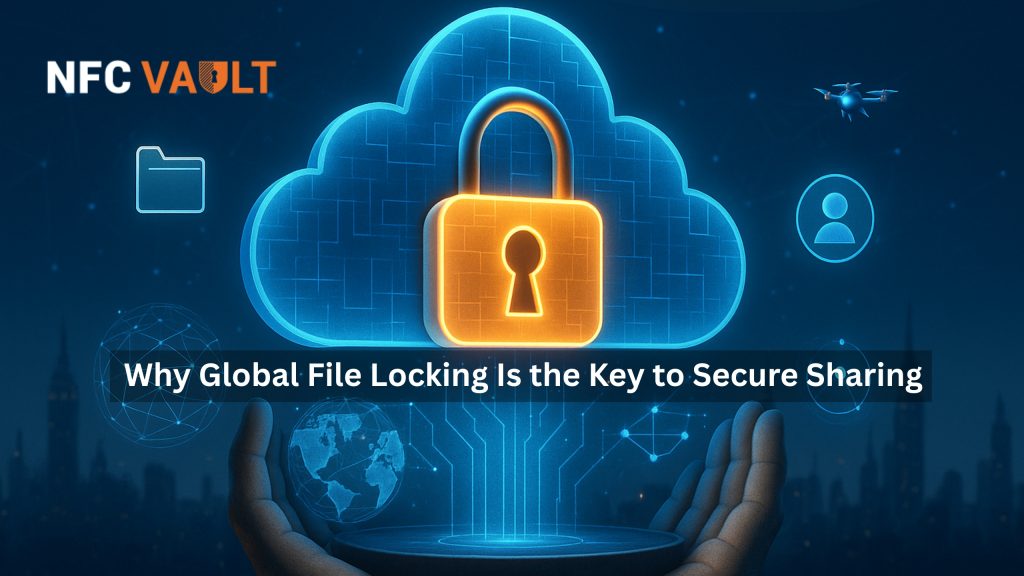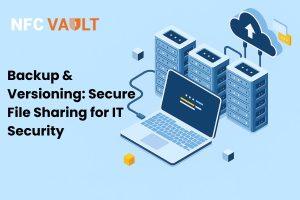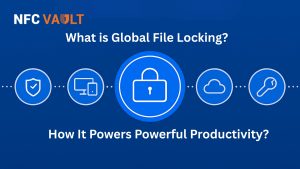Introduction: The Dilemma of Modern File Sharing
With hybrid working and multi-site collaborations, companies have to deal with data conflicts now and then. Teams working in two or more offices might be doing the same reports, CAD drawings, or financial models. Without controls, if the edits were simultaneous, confusion, duplication, and even data loss may occur. Hence, Global File Locking has become one of the newest and most indispensable features for secure collaboration.
Unlike traditional Windows file servers or a simple internet file server, the Global File Lock does not let a file being edited by one user to be available in read-only mode to the others until the lock is released. It means that one user edition conflicts with other versions; thus, consistency is maintained for every update made. With a solution like NFC Vault, an organization achieves a file-sharing solution without compromise to security, compliance, and collaboration.
What is Global File Locking?
Essentially, Global File Locking is a system designed to maintain the conflict-free state of files during collaboration. The way it works is as follows:
- A file being opened for editing by User A is locked to session.
- Users B, C, and others can access it but only in a read-only mode.
- The lock is released when User A saves and closes the file.
Thus, whoever is next in line with permission to open and edit this file now has it secured for enterprise file sharing.
The above process is fairly seamless with an interface like NFC Vault that merges Global File Lock with enterprise-grade controls such as multi-factor authentication, Active Directory integration, and secure cloud file sharing.
Why Data Conflicts, When Left Behind, Constitute a Real Risk
Ending up without a global file locking feature, organizations most often deal with:
- Loss of work: Edited versions override some indispensable changes.
- Confusion: Teams work on different file versions at the same time.
- There are Compliance Issues: Fines come from inaccurate documentation in a regulated industry.
- Loss of Productivity: People are on the clock trying to reconcile versions instead of pushing innovation.
Imagine two managers in two different countries editing a financial report. Both make imperative changes, but only one set is saved. Consequently, uninformed decisions are taken on strategy with reputational damage. Global file locking eliminates such conflicts to deliver trusted secure file-share solutions to the industries.
How the Global File Lock Prevents Data Conflicts
The advantage Global File Lock offers is as follows:
- Controlled Editing Access: One can edit only at a time.
- Transparency: Others know that the file is locked and who has done it.
- Version Protection: No overwriting or duplication of effort.
- Security: End-to-end encrypted sharing.
In tandem with the NFC Vault, this is not just a feature but an entire secure cloud file sharing platform for businesses. The teams working from offices or across continents can now collaborate without worrying about the unintended overwriting of each other.
Benefits of Global File Locking for Businesses
- Ensuring Data Integrity
Files have to stay accurate, consistent, and free of any conflicts.
- Enhances Compliance
Industries like healthcare and finance require transfer of files in accordance with GDPR. Thus, by precluding unauthorized overwriting, Global File Locking contributes to regulatory compliance.
- Enhances Productivity
Productivity takes a hit when team members waste hours untangling file versioning issues.
- Ensures Protection of Vital Data
Critical data remain protected in association with antivirus, ransomware protection, file versioning, and file backup.
- Provides Cross-Location Collaboration
Businesses running offices in different locations are thus able to work seamlessly via NFC-Vault, an enterprise-class secure file sharing solution.
NFC Vault: Secure File Sharing Powered by Global Lock
Even global file locking touts the power of its ability when paired with a platform built for enterprise security. This is where NFC Vault sets in.
Some of the features provided by NFC Vault are:
- Global file locking to allow conflict-free collaboration.
- Active Directory integration to grant identity management.
- Multi-factor authentication, offering an added layer of access control.
- End-to-end encryption, protecting files while traveling and at rest.
- Secure cloud sharing of files for businesses without relying on VPNs.
- Version control and backups to restore files.
Businesses replace their old file sharing servers, opting for the most secure file sharing service available for businesses with NFC Vault; that guarantees the consistency and compliance of all their documents.
Case Study: Engineering Collaboration
Imagine an international engineering firm with offices in three locations: Dubai, London, and New Delhi. Engineers work on drawings worth millions of dollars. Without Global File Lock, there is frequent capturing of new edits by other parties, leading to costly reworks.
It is by this way that, through the adoption of NFC Vault, each CAD file gets the protection of Global File Lock, i.e., only a single engineer can work on it at once, with everyone else gaining read-only access and expecting a real-time notification when the file becomes available. Now we achieve error-free collaboration, faster project completion, and a diminished operational risk.
Comparison: With vs. Without Global File Locking

How does global file locking fit into modern secure sharing?
In a remote-first economy, file security for business applications ought to be more than just storage. It ought to:
- Replace file servers with the cloud, so that hosting is scalable.
- Allow VPN-free access to files so as to provide flexibility.
- Share files securely while on the move for mobile employees.
- Allow for seamless file collaboration between locations.
Global file locking builds up all these needs, and platforms such as NFC Vault help companies embrace secure cloud file sharing with ease.
The File Lock Solution- Future of Enterprise Sharing
With increasing AI-powered data management platforms and hybrid cloud infrastructures, the requirement for secure collaboration free from conflicts will only grow. Combined with offline access, SSO, and ransomware protection, global file lock should form the basis for any enterprise file sharing solution.
In choosing NFC Vault, enterprises get a complete secure solution and file sharing tool, thus considered future-proof, compliant, and globally accepted.
Conclusion
Data conflicts are more than an annoyance: They may present a regulatory compliance risk, a reputational risk, and productivity risk. The way forward lies in Global File Lock, where files are kept constant, secure, and versioned.
Together with the enterprise secure cloud file sharing, NFC Vault allows organizations to collaborate globally without worrying about overwrites or data loss.
In a nutshell: Why does Global File Lock matter in secure sharing? Because it guarantees conflict-free operations, compliance, and trust-the pillars on which modern enterprises thrive.
Also read this blog: How Global File Locking Ensures Better Secure & Powerful File Sharing
Frequently asked Questions
Q1. Why is Global File Lock important?
Because it prevents conflicting edits, file versions remain consistent and reliable across global teams.
Q2. How does NFC Vault use Global File Lock?
NFC Vault integrates file locking into enterprise security tools that include encryption, MFA, and Active Directory.
Q3. Does Global File Lock operate with CAD and large files?
It does. It is meant to serve a secure enterprise collaboration platform, including design, CAD, and financial-world documents.
Q4. Is Global File Lock cloud-compatible?
Absolutely so! Because Global File Lock is built into NFC Vault, it facilitates secure file sharing for the cloud for enterprises.
Q5. Can Global File Lock assist in regulatory compliance?
Yes. The file transfer allows for compliance under GDPR, HIPAA, and other regulatory standards.



